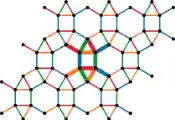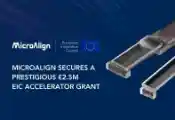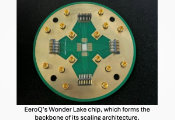Advancing Quantum Sensing for the DoD: From Lab to Orbit Within Months
WASHINGTON, D.C. (July 29, 2025) — The Defense Innovation Unit (DIU) and the Air Force Rapid Capabilities Office (AFRCO) X-37B program office partnered to demonstrate an emerging technology critical to the Department of Defense: the first strategic grade quantum inertial sensor in space. The payload is scheduled to be part of the eighth mission of the X-37B Orbital Test Vehicle (OTV-8) on August 21, 2025, from Kennedy Space Center, Florida.
In the Fall of 2023, DIU, Vector Atomic and partner Honeywell aerospace delivered the quantum inertial sensor, the first space hardware for the company. After delivery of the space experimental payload, the team fully integrated the quantum inertial measurement unit (IMU), a fundamental system needed for comprehensive inertial navigation. Extensive ground and flight tests will be executed this Fall. Lessons learned from qualifications of the space inertial sensor directly contributed to subsequent design cycles, emphasizing the benefits from rapid prototyping for emerging technology like quantum sensing. This space experiment is a notable benchmark in DIU’s Transition of Quantum Sensing (TQS) program, one in a series of operationally relevant quantum sensing demonstrations occurring across all domains.
TQS is a collaboration between DIU, Office of the Undersecretary of Defense for Research & Engineering's Quantum (OUSD(R&E)-Quantum), and the Services, aims to accelerate fielding of quantum sensors to address strategic Joint Force needs, to include positioning, navigation, and timing (PNT) and anomaly detection missions. The collaborative approach of the TQS program combined with a mixture of startups, non-traditional government contractors, traditional defense contractors, and DoD laboratories, is vital for delivering the next generation of resilient and precise navigation capabilities. Along with the TQS inertial efforts, DIU and stakeholders are conducting field tests for magnetic, gravity aided navigation as well as anomaly detection across land, sea, air, and with this mission space- domains.
This quantum inertial sensor represents a notable progression for the quantum community. “Building a fully integrated, high performance atomic instrument that meets the rigor for space qualification is a positive referendum for quantum sensors as it relates to practical DoD missions. Demonstrations like the quantum inertial space experiment confirms the maturation the DoD needs to see from the quantum sensing community,” says LtCol Nicholas Estep, Director of the Emerging Technology Portfolio at DIU.
The opportunity to work with the X-37B program is a first for DIU, paving a path to inject new technologies in the space domain relevant to the DoD. The X-37B orbital test vehicle, a platform ideal for dynamic space operations, is well suited as a partner for a quantum PNT sensor. In addition to providing a unique experimental environment, the collaboration allowed a non-traditional company without space heritage to collaborate with traditional space integrators. The partnership between DIU and AFRCO X-37B program could open the aperture for emerging companies and technology within DIU to find paths to orbit.




































